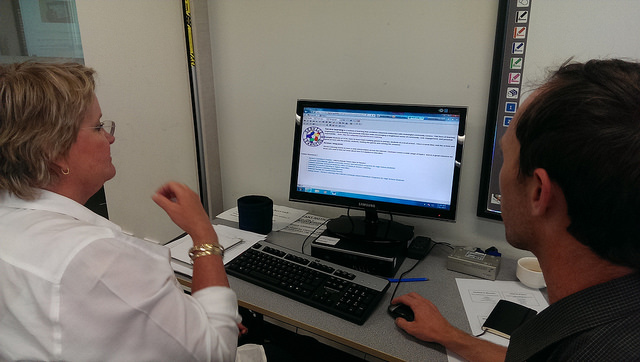OER in Adult Education
Our next post for Open Education Week is from Sara Frank Bristow on the ADOERUP work to produce a “Note” (short briefing report) to the European Parliament Culture and Education Committee on the use and potential of Open Educational Resources (OER) for Adult Education/Adult Learning. This work supports the POERUP, Policies for OER Uptake previously posted about on this blog.
 Sara Frank Bristow, founder of Salient Research, LLC, is a digital education researcher and writer based in Chicago, US. She is presently writing the UK Country Report for the Sero Consulting Ltd ADOERUP (Adult Education and Open Education Resources) study. Recent projects for Sero and other clients have focused on online, blended and open learning, with an emphasis on drivers, business and learning models for OER.
Sara Frank Bristow, founder of Salient Research, LLC, is a digital education researcher and writer based in Chicago, US. She is presently writing the UK Country Report for the Sero Consulting Ltd ADOERUP (Adult Education and Open Education Resources) study. Recent projects for Sero and other clients have focused on online, blended and open learning, with an emphasis on drivers, business and learning models for OER.
***
Adult Education and Open Education Resources
Adult learning is a vital component of the European Commission’s lifelong learning policy. It is essential to competitiveness and employability, social inclusion, active citizenship, and personal development across Europe. The challenge is to provide learning opportunities for all, especially disadvantaged groups who need them most. It comprises formal, non-formal, and informal learning for improving basics skills, obtaining new qualifications, up-skilling, or re-skilling for employment. The demand for adult learning is increasing and the Commission is committed to helping all EU countries create adult learning systems characterised by flexibility, high quality, excellent teaching, and an enhanced role for local authorities, employers, social partners, civil society, and cultural organisations.
In 2013 the European Commission published a communication on OER and MOOCs. This highlighted the potential of OER in adult learning. OER in fact make use of large scale digital technologies and the aim is to support a radical development of new teaching methodologies based on the use of ICT. The Communication emphasizes that, likewise, in adult learning ICT and OER offers huge potential for structural change. Therefore efficient tools and methodologies will prove decisive in handling future funding needs. In the Communication, the Commission mentions that it plans to create a new network called EPALE (Electronic Platform for Adult Learning in Europe).
Coverage of the ADOERUP report
I am now working on a study to highlight the possibilities offered by the employment of OER with the overall aim to:
- Review the availability and feasibility of OER in adult learning, and
- Make suggestions for possible action to be taken.
The study is thus expected to serve three distinct functions: Description, Assessment and Recommendations.
With regard to the general objectives outlined above, the following general questions will be addressed and answered in the study:
- What is the availability and feasibility of OER in adult learning?
- What possible actions may be taken in order to enhance the use of OER in adult learning?
While answering these general questions, a few more specific ones will be addressed, as well:
- How can OER be integrated into certified courses provided to adult learners? What is their sustainability (in terms of work and funding)?
- What quality aspects may be considered in the use of OER in adult learning? What quality assurance issues may be considered? How OER can improve the quality and efficiency of training and education in adult learning?
- Is management of Creative Commons licenses specific and in what respect?
- Do OER improve the knowledge base on adult learning and contribute to a better monitoring of the adult learning sector? If yes, how?
- How OER can contribute to raising participation rates in adult education?
- What are the implications for educational planners and decision-makers of use of OER in adult learning? In particular what issues of accreditation/validation of skills and competences acquired via OER could be considered?
- How existing policy tools to support adult learning can best be used for the inclusion of OER?
- What is the role of educational establishments (particularly universities) to design, plan and implement education based on OER?
The study will focus on: United Kingdom, Spain, France, Sweden, Latvia, Hungary, Romania and Germany.
Asking for help
Sero has been commissioned to do a report for the Education and Culture Committee of the European Parliament on OER in Adult Education in the EU. Obviously we shall leverage on POERUP and on three relevant studies done for IPTS but we want to make sure we are up to date with the last 6 months of information on important projects developing OER for use specifically in Adult Learning (rather than spilling over into Adult Learning) – across all educational sectors: key skills (numeracy, literacy, IT skills, etc), school-level qualifications for adults, Vocational Education and Training, and University Education in a Lifelong Learning context.
We are particularly interested in the following Member States: UK, France, Germany, Spain, Hungary, Romania, Sweden and Latvia, but projects from any Member State are of interest.
Of course we shall be asking POERUP project staff as well as our network of consultants and advisors but we want a broader range of input.
For policy aspects I shall be talking in depth to authors of EU-level and Member State OER-related policy documents, to perform a realignment of POERUP-style recommendations to the Adult Learning/Lifelong Learning/Flexible Learning domain.
Please contact Paul Bacsich if you are a local expert or policy expert with relevant information.
 Open Education Working Group
Open Education Working Group 




Leave a Reply